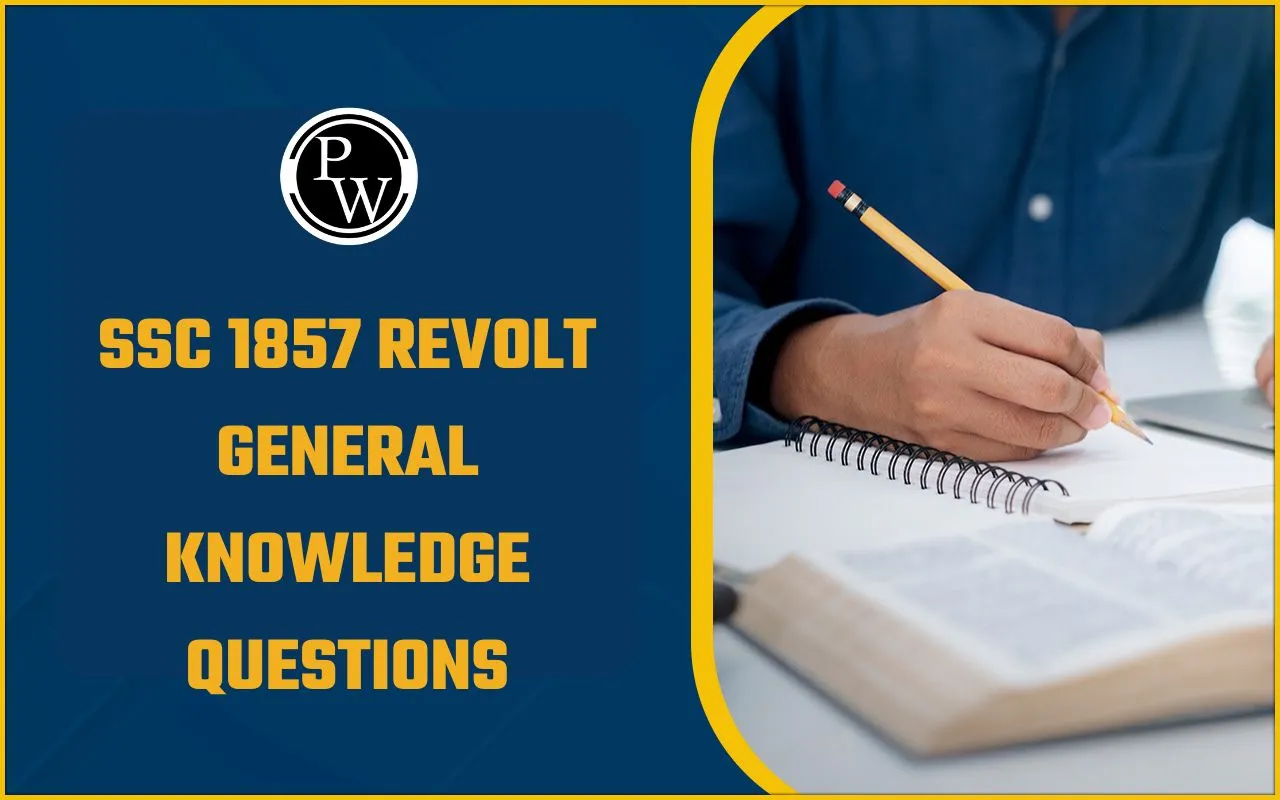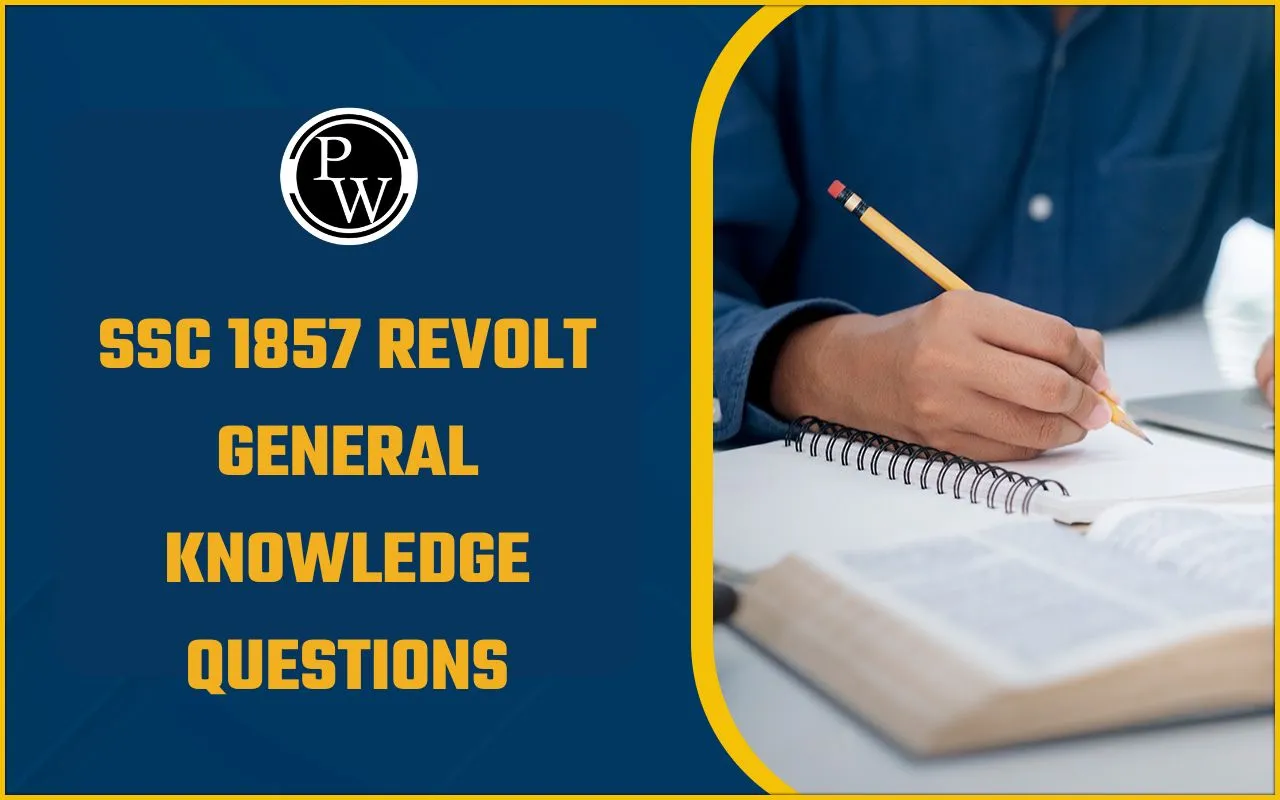

SSC 1857 Revolt General Knowledge Questions: The Revolt of 1857, often referred to as India's First War of Independence, is a highly significant event in Indian history. Knowledge about this uprising is crucial for candidates preparing for various competitive examinations, including those conducted by the Staff Selection Commission (SSC). Mastering the SSC 1857 Revolt General Knowledge Questions is essential for scoring well in the history section.
SSC 1857 Revolt General Knowledge Questions
SSC 1857 Revolt General Knowledge Questions are considered an essential practice material. It is helpful for candidates to revise the important historical dates. Candidates should focus on revising the 1857 revolt notes for the SSC exams. Then, solve the 1857 revolt multiple-choice questions with answers. It can help them to understand the topics in a better way. They can improve the chances of scoring well in the actual SSC recruitment exams.
Key Facts About the 1857 Revolt
The uprising commenced on May 10, 1857, in Meerut. It was initially a sepoy mutiny but quickly transformed into a widespread revolt against British rule.
-
Immediate Cause: The introduction of the Enfield rifle with cartridges believed to be greased with animal fat (pig and cow), which offended both Muslim and Hindu sepoys.
-
Political Causes: Annexation policies like the Doctrine of Lapse (by Lord Dalhousie) and the refusal to recognise the titles and pensions of many Indian rulers.
-
Economic Causes: High taxation, oppressive land revenue policies, and the destruction of traditional Indian industries.
-
Important Leaders and Centres:
-
Delhi: Bahadur Shah II (Nominal), General Bakht Khan (Actual Command)
-
Kanpur: Nana Saheb, Tantia Tope
-
Lucknow: Begum Hazrat Mahal
-
Jhansi: Rani Lakshmibai
-
Bareilly: Khan Bahadur Khan
-
Bihar (Jagdishpur): Kunwar Singh
-
Governor-General During the Revolt: Lord Canning.
-
End of the Revolt: The revolt was largely suppressed by the British within a year, leading to the Government of India Act 1858, which transferred power from the East India Company to the British Crown. This act also made the Governor-General the Viceroy of India.
1857 Revolt Multiple Choice Questions with Answers
Practising multiple-choice questions is the best way to revise and assess preparedness for the SSC exams. Candidates should practice the 1857 revolt objective questions for SSC and check their performance by referring to the answers. A table has been provided for the SSC 1857 revolt general knowledge questions with solutions.
Q1. Which Mughal ruler contributed to the revolt of 1857?
(A) Shah Alam II
(B) Bahadur Shah I
(C) Alamgir II
(D) Bahadur Shah II
Answer: (D) Bahadur Shah II
Q2. On which of the following dates did the Revolt of 1857 start?
(A) May 31
(B) May 10
(C) May 20
(D) May 28
Answer: (B) May 10
Q3. The sepoys of Meerut arrived at the Gates of Red Fort to meet the Mughal emperor, Bahadur Shah, on—
(A) 11 March, 1857
(B) 10 March, 1857
(C) 10 May, 1857
(D) 11 May, 1857
Answer: (D) 11 May, 1857
Q4. What was the immediate cause of the Revolt of 1857?
(A) Introduction of the Enfield rifle
(B) Economic exploitation by the British
(C) Religious conflicts
(D) Discontent among the sepoys
Answer: (A) Introduction of the Enfield rifle
Q5. What is the alternative name given to the Revolt of 1857 by British historians?
(A) Indian Rebellion of Independence
(B) Sepoy Mutiny
(C) Indian War of Liberation
(D) Indian National Movement
Answer: (B) Sepoy Mutiny
Q6. What role did religious factors play in the Revolt of 1857?
(A) Religious motives were the primary cause of the rebellion
(B) Religious unity among Indians was a driving force behind the revolt
(C) Religious factors had a limited impact on the uprising
(D) None of the above
Answer: (C) Religious factors had a limited impact on the uprising
Q7. What were the reasons for the Indian uprising against the British before 1857?
(A) Colonial exploitation
(B) Heavy duties on Indian industries
(C) Destruction of the indigenous industry
(D) All the above
Answer: (D) All the above
Q8. Which of the following was not a cause of the Revolt of 1857?
(A) Economic grievances of Indian soldiers
(B) Religious conflicts between Hindus and Muslims
(C) Social reforms introduced by the British
(D) Political annexation of Indian territories
Answer: (B) Religious conflicts between Hindus and Muslims
Q9. Which of the following was not a political cause of the Revolt of 1857?
(A) Doctrine of Lapse
(B) British Expansion
(C) Subsidiary Alliance
(D) Introduction of Railways
Answer: (D) Introduction of Railways
Q10. Which administrative policy of the British created dissatisfaction among Indian soldiers and civilians before 1857?
(A) Equal representation in governance
(B) High promotions for Indians
(C) Exclusion of Indians from key administrative posts
(D) Abolition of slavery
Answer: (C) Exclusion of Indians from key administrative posts
Q11. Who was the Indian soldier considered the catalyst for the Revolt of 1857?
(A) Bahadur Shah Zafar
(B) Rani Lakshmibai
(C) Mangal Pandey
(D) Tantia Tope
Answer: (C) Mangal Pandey
Q12. Who called the “1857 Uprising” the “First War of Independence”?
(A) Prof. N. R. Phatak
(B) P. E. Roberts
(C) Dr. R. C. Majumdar
(D) V. D. Savarkar
Answer: (D) V. D. Savarkar
Benefits of Practicing 1857 Revolt MCQ for SSC Exam
Consistent practice of the 1857 revolt MCQ for the SSC exam offers several advantages to aspirants to improve their performance.
-
Identifies Weak Areas: By attempting SSC history 1857 revolt questions, candidates can pinpoint specific subtopics within the revolt (e.g., causes, outcomes, individual leaders) where their knowledge is lacking, allowing for targeted study.
-
Improves Speed and Accuracy: SSC exams are time-bound. Practising these multiple-choice questions helps in quick recognition of the correct answer, enhancing both speed and accuracy.
-
Familiarity with Exam Pattern: The format of the 1857 revolt quiz for SSC mirrors the actual exam, making candidates comfortable with the question style and difficulty level.
-
Effective Revision Tool: Solving the 1857 revolt multiple-choice questions with answers serves as an excellent, active form of revision, far more effective than passive reading. The key is to thoroughly understand the explanation behind each correct answer.
Revolt of 1857 Questions and Answers PDF
Candidates often seek resources like the revolt of 1857 questions and answers PDF. These digital documents compile a large number of 1857 revolt important questions for SSC CGL and other SSC exams. They allow students to focus on studying anytime and anywhere. A dedicated 1857 revolt GK PDF download should be maintained for quick last-minute review.
Revolt of 1857 Questions and Answers PDF
